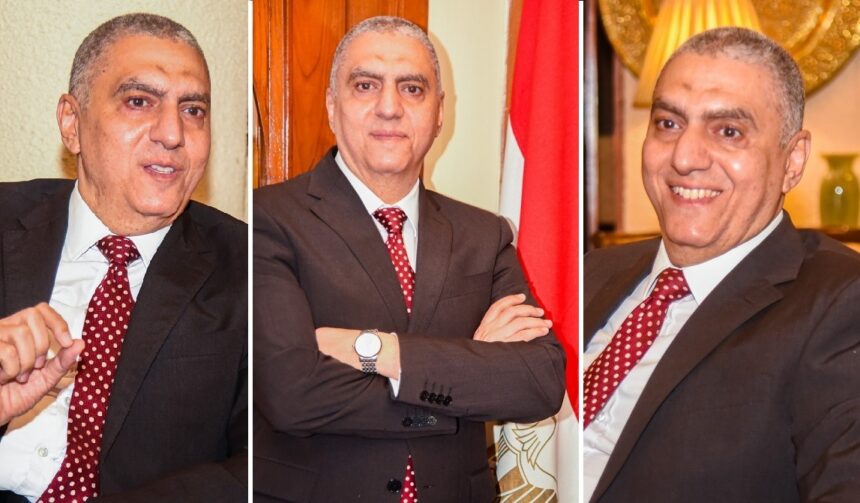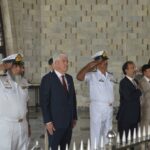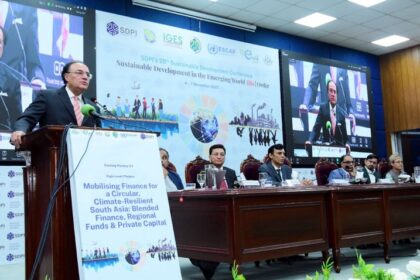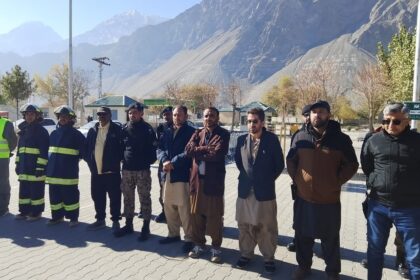
Pakistan Egypt can benefit from Exchange of Experiences in Corridor Development
Ambassador of Arab Republic of Egypt ,H.E Dr. Ihab Mohamed Abdelhamid Hassan
Interview : Tazeen Akhtar
The Ambassador of the Arab Republic of Egypt to Pakistan, H.E Dr. Ihab Mohamed Abdelhamid Hassan, in an interveiw has said, President El-Sisi has accepted an invitation to visit Pakistan, and both foreign ministries are coordinating the timing of this important visit. Both countries can benefit greatly by exchanging experiences in corridor development, logistics management by enhancing the cooperation in maritime connectivity and jointly promoting trade routes.
“Egypt is playing a constructive and responsible role in helping its neighbors, Libya and Sudan, achieve peace and stability. Egypt prevents illegal migration but at the same time emphsizes the need for addressing the root causes , open legal migration channels and youth employment opportunities. The Sharm El-Sheikh Peace Summit on Gaza reflected Egypt’s unwavering commitment to regional peace and humanitarian relief, Ambassador has noted in the interview.
Commenting on connectivity potential , H.E said, “Indeed, both countries occupy central positions that make them natural bridges between continents. Egypt has vast experience in global connectivity through the Suez Canal, which is one of the world’s busiest maritime routes linking Asia and Europe. Pakistan, through CPEC and the Gwadar Port, is emerging as a vital link connecting China, Central Asia, and the Middle East to the sea.”
He added, Egypt and Pakistan can benefit greatly by exchanging experiences in corridor development, logistics management, and infrastructure security. Both nations can cooperate in enhancing maritime connectivity, sharing expertise in port modernization, and jointly promoting trade routes that connect the Red Sea and the Arabian Sea for mutual benefit.
regarding crisis in two countries bordering Egypt, Ambassador replied , ” Egypt is active in promoting political settlements among its neighbors, especially in Libya and Sudan, to prevent the spread of instability.
H.E further said, Egypt continues to play a constructive and responsible role in helping its neighbors achieve peace and stability. In Libya, Egypt has hosted multiple rounds of talks between rival factions and encouraged the unification of Libyan institutions, especially the armed forces.
Cairo’s mediation aims to ensure a political solution that preserves Libya’s unity and sovereignty. In Sudan, Egypt supports ceasefire efforts and humanitarian access while calling for dialogue between the conflicting parties. Egypt’s approach is based on respect for the sovereignty of both nations.
On The Sharm El-Sheikh Peace Summit , Ambassador said, itreflected Egypt’s unwavering commitment to regional peace and humanitarian relief. Egypt has consistently mediated between parties in the Gaza conflict and kept its borders open for humanitarian aid, medical evacuation, and relief operations. Pakistan’s participation demonstrated shared concern for the Palestinian people.
Moving forward, both Egypt and Pakistan can cooperate more closely in the reconstruction phase, with Egypt facilitating logistical routes and Pakistan contributing its expertise and manpower in housing, health, and education projects. Together, the two countries can advocate for a sustainable political solution based on justice and the legitimate rights of the Palestinian people.
To a question on Pakistani Prime Minister and Field Marshal visited Egypt in Oct and met with President Abdel Fattah El-Sisi , Ambassador shared, “Economic cooperation between Egypt and Pakistan holds great promise. Both countries’ leaders have agreed to expand trade and investment through joint ventures and industrial collaboration. Beyond the success story of the telecom sector, new opportunities lie in renewable energy, information technology, pharmaceuticals, textiles, fertilizers, construction materials, and food processing.”
“Egypt’s Suez Canal Economic Zone offers incentives for Pakistani investors, while Pakistan’s Special Economic Zones under CPEC can attract Egyptian enterprises. Business councils from both sides are now working to increase private-sector linkages and facilitate easier market access, H.E Ihab noted.
H.E said, Egypt and Pakistan already enjoy strong military-to-military relations built on trust and mutual respect. Both participate in joint exercises which enhance interoperability and professional understanding.
Regarding visit of the President to Pakistan, Ambassador said, “Egypt looks forward to maintaining the momentum of high-level exchanges. President Abdel Fattah El-Sisi has accepted an invitation to visit Pakistan, and both foreign ministries are coordinating the timing of this important visit.”
“In addition, there are plans for Egyptian ministerial and defence delegations to visit Islamabad soon to follow up on the agreements made during the Pakistani leadership’s visit to Cairo. Such exchanges reflect the political will of both governments to deepen the strategic partnership, H.E added.
On illegal migration from North Africa to European countries through the Mediterranean, Ambassador said, Egypt deeply regrets the loss of lives caused by irregular migration and has taken firm steps to combat this tragic phenomenon. The Egyptian government enforces strict anti-smuggling laws and has succeeded in preventing illegal migration from its Mediterranean coast since 2016.
Egypt works closely with the European Union and neighboring countries to dismantle trafficking networks, strengthen border controls, and promote awareness about the dangers of irregular travel. At the same time, Egypt emphasizes the need for legal migration channels, youth employment opportunities, and addressing the root causes—poverty and conflict—that push people to take such dangerous journeys.
Ambassador said, Egypt warmly welcomes Pakistani students and offers various scholarships in engineering, medicine, pharmacy, information technology, and Islamic studies at prestigious institutions such as Cairo University, Ain Shams University, and Al-Azhar University.
The Egyptian government provides affordable education and hosts thousands of international students every year. Cooperation between educational authorities of both countries is expanding, especially in research and academic exchange.
“Regarding branch campuses, Pakistan’s new policy allows foreign universities to establish campuses in the country, and Egypt is open to exploring this opportunity if it meets academic and regulatory standards. Strengthening academic ties will bring our youth closer and enhance people-to-people friendship between the two nations, he shared.
Read in Urdu: پاکستان اور مصر راہداری ترقی کے تبادلے سے فائدہ اٹھا سکتے ہیں











